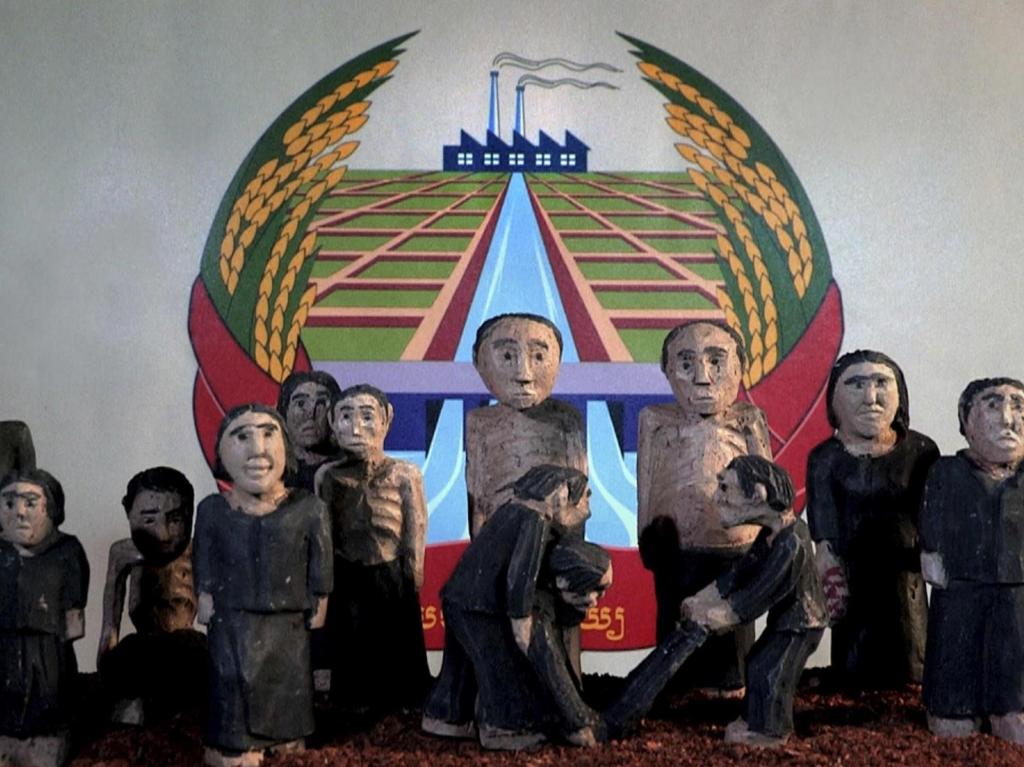It’s all there in the name: The Missing Picture (L’image manquante), the absence of evidence of a time that has long passed. The same significance simmers in an opening that cuts from piles of charred film canisters, to fumbled-through reels of celluloid, to the projection of the speckled images contained within – only to wash it all away with the crashing of a wave-filled ocean. In the void left by the lack of a concrete chronicle, filmmaker Rithy Panh attempts to fill in the gaps. Clay and wood figurines, archival footage and melancholy narration are his weapons of recreation, wielded with precision and passion by sculptor Sarith Mang.
Walking through his own past, and wading deeper into the pool of Cambodian cultural and historical insight that his documentary work comprises thus far, Panh’s quest commences with a plaintive declaration. ‘In the middle of life, childhood returns. The water is sweet and bitter. I seek my childhood like a lost picture, or rather it seeks me,’ he opines, the words voiced in French by narrator Randal Douc (The Sea Wall). Panh yearns for meaning in its darkest abyss, in the atrocities of the Khmer Rouge’s 1970s purge of the country. On screen, the tiny figurines are employed as a method of reaching towards catharsis, overlaid on and through the scant material that does remain.
Exquisitely staged scenes show the fleetingly beautiful and the inescapably brutal, the labour camp and killing field settings dictating the latter more frequently than the former. A telling image of Panh’s childhood self, watching the film scraps he faithfully collected, resonates as a portrait of innocence, heightening the sorrow that emanates from earthen versions of darker memories. Sites of executions with all their evident foreboding, rows of hospital patients lined up in halls of death, and prolonged rituals of mourning: each haunts with their inherent horrors. The filmmaker’s inanimate surrogate lingers in the dioramas, jumping from chapter to chapter of his experiences. Miniature creations channel his grief, awash in barbarism unfortunately lived but never forgotten.
This isn’t Panh’s first attempt at re-staging Cambodia’s troubled times under dictator Pol Pot, his 2003 effort S-21: The Khmer Rouge Killing Machine re-inserting former inmates and reformed guards into their old roles. Here, he crafts a different type of contrast with conscientious attention to detail, an affecting and unshakeable statement made through the juxtaposition of models of simplicity with events of complexity. His method is unorthodox but stunningly effective, providing the perfect platform for the mix of anecdotes, musings and informative context that constitutes the bulk of his film. The modesty of the feature’s meticulous construction allows the content, not the filming technique, to monopolise attention.
The act of manufacture touches every element of The Missing Picture, the 2013 Academy Award nominee for best foreign-language film forever cognisant of its status as a reflection, not reality. Asides depict the carving of the crucial figures, and propaganda of the time is intercut and analysed, consistently focusing on a terrible truth: there can never been an official account of Panh’s forsaken adolescence. Instead, he attempts to reclaim his 13-year-old self and commit his tale to the record, but remains aware of the subjective nature of the feat. This understanding and acceptance is as audacious as the method of emotional expression, and as immersive as it is important, resulting in a documentary both painstakingly intricate and powerfully intimate.
Rating: 4 stars out of 5
The Missing Picture (L’image manquante)
Director: Rithy Panh
Cambodia / France, 2013, 92 mins
Release date: March 20
Distributor: Sharmill
Rated: M
The Big Picture Film Festival
www.thebigpicture.org.au
19 – 30 March
Actors:
Director:
Format:
Country:
Release:





